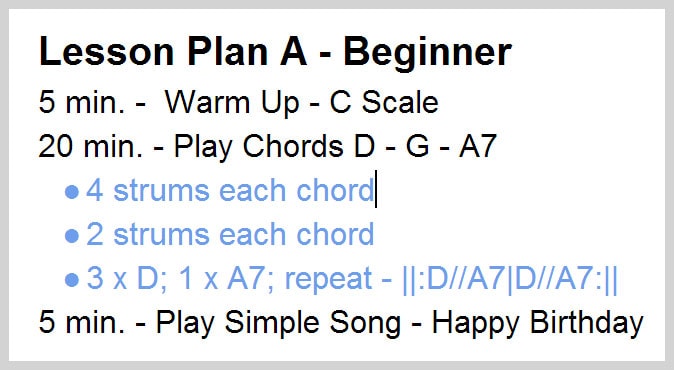Here are 6 principles with practical examples to help you build a solid guitar practice routine.
Decide What You Want To Practice.
Think ahead about what you want to get better at and choose one or two things to focus on. If you are taking lessons your teacher would probably have some input. It will help you stay motivated if you focus on a few things and see progress, rather than practice everything a little.

For example: You might decide that for the next two weeks you want to improve your speed on a specific scale. You’ll practice guitar for 6 days each week. For 3 of the days each week spend most of your session on those scales, and track your progress using a metronome. Each day you practice it with the intention of raising the speed a little.
At the end of this two week period do a quick victory dance to celebrate your accomplishment, then set another goal.
You’ll notice that I didn't say practice guitar scales everyday. You don’t have to practice the same thing every day, and I recommend that when you are pushing to make specific progress on a particular technique that you take breaks from that technique, and give your muscles time to recover. Some techniques will be more strenuous than others. In the example above I’d recommend you try one day on, and one day off, though you’ll want to experiment with this.
Find A Place To Practice Where You Will Not Be Interrupted.
Find or create a space that is your “practice space”. Keep in mind that you want to practice uninterrupted for your entire session. The kitchen table in a busy house is probably not the best place. Though you don't need to be completely isolated you do want others in the house to know that this is your time for yourself. Remember this is only a small portion of your day, and you deserve this time.
I’ve chosen to create a room that has my guitar, guitar tuner, and recording equipment setup that is ready to go. Though this setup is ideal it may not be possible in your situation. Having your guitar setup in the bedroom can be just as effective. Have an agreement with family members that this is your guitar practice schedule and you need 30 to 45 minutes of uninterrupted time.
Organize Your Practice In The 3 Sections.
Warm Up
1. Improvement/Working On
2. Close Up
3. Improvement
Warm Up – Can be something fairly routine like scales or an exercise.
Improvement – This should be the meat of your practice. Examples may include a new song you are working on, new chords, or perhaps a new exercise. This could also include an exercise that you are actively working on to improve your performance and tracking your progress.
Close Up – Play something you enjoy playing to end on a positive note.
Make Practicing Itself A Habit By Practicing Daily For 30 Days.
Studies show the doing something for 30 days tends to make it a habit. Use this to your advantage by practicing 30 days straight. You will likely find it easier to get yourself to practice after that 30 days. Then you can adopt a different schedule that would allow for a day or two off each week.

Use Good Practice Techniques When Practicing To Get The Most Progress.
To make the most of your valuable practice time use good practice techniques. Make it a point to learn how to practice the guitar, and especially how to practice guitar effectively. There isn't sufficient space in this article to do a thorough job, but I will list a few important guitar practice tips.
- Keep good posture and hold your guitar properly.
- If you don’t pay attention to posture now it will get you later. Develop good habits that will support your long term progress.
- Practice guitar slowly and accurately, then pick up speed.
- Don’t practice doing an exercise or song improperly. This will become a habit that will hold you back. Go slow at first and strive for accuracy, then pick up speed little by little.
- Use guitar exercises to improve specific techniques
- Don’t just practice songs. Use exercises to focus on specific areas you want to improve on such as changing chords more smoothly or getting your fingers in the right place on the fretboard. Practice guitar scales as a warm up exercise. Keep track of your beats per minute on a chart to see your progress.
- Practice guitar for 30 – 50 minutes sessions
- You can make steady progress with 30 minute sessions when done consistently. Of course you make faster progress by practicing more, but there is a diminishing return as you get tired. Take breaks if you can practice for longer than 50 minutes.
- Use a metronome for some but not all of your progressive practice.
- A metronome is a valuable tool to develop your timing and measure your progress on exercises. At the same time you don’t want to become dependent on the metronome for good rhythm. Always make time to practice without a metronome.
Play For Fun
Make time to play just for fun without the structure of a formal guitar practice session. This keeps things fresh and alive. You don't want learning the guitar to always be hard work. By setting aside structured time to practice guitar you'll be making steady progress. By making time to practice for fun you will remember why you wanted to play guitar in the first place.
Optional:
It’s helpful, but not mandatory, to practice the same time each day for that first 21 day period. This helps to reinforce the habit faster.
Other ideas:
I like to compose music during another session separate from my technique practice, but if I get a good idea while practicing I’ll go with it. Creating new music is a priority for me, but I know I have to make time to keep my technique up as well.
Tell Us What You Think - Please Comment Below!
We would love to hear your comments and questions. What specific things are you struggling with while learning guitar?

Thanks Tomas. Always excellent advice from a great teacher and this is helpful as ever. cheers!
Thanks Tomas for your practical advice. Positive reinforcement will always help to bring me back. I enjoy your down to earth style and your specific recommendations are key to hitting home! Your generosity is much appreciated…
Deb
Hi Deb! I am flattered on how you find my practical advices and specific recommendations. It’ll definitely keep me going. Thanks much!
Thanks for the practice tips. I am still a little slow on the scales, but I am getting better.
Yey! That is soo good to hear Minnie, at least you’re getting better.
I know for sure that you are doing your best practicing.
Keep it up!
Tomas